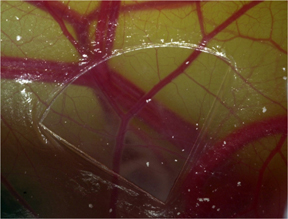A Chick Embryo
Chorioallantoic Membrane Assay of AFPep as a Proangiogenic
Factor
Katheryn Dorsey
Department of Biology, Hamilton College, Clinton, New York
Abstract of
Proposal
Human alpha-fetoprotein (AFP) is an
oncodevelopmental protein produced by the fetal yolk sac and liver
during gestation and expressed by certain malignant tumors in the
adult. AFP exerts diverse growth-regulative and immunosuppressive
effects. Specifically, its expression is associated with increased
vascularization in the developing fetus and in adult tumors, implying
a role in the developmental processes of vasculogenesis and
angiogenesis. To investigate the angiogenic effects of AFP on
microvascular endothelial cells in vivo, I will employ a chick
chorioallantoic membrane (CAM) assay. This will involve exposure of
he CAMs of avian embryos to AFP, and subsequent observation of the
extraembryonic membranes in ovo, using the technique of windowing.
Blood vessel density and tortuosity will be photographed and evaluated
using microscopic tools and software. It might also be useful to
study the synergetic proangiogenic effect of AFP and Vascular
Endothelial Growth Factor (VEGF) by applying both proteins to the CAM
in varying concentrations. The ultimate significance of this
experiment will be a better understanding of the angiogenic activity
of AFP, which has implications in medicine, as blood vessel growth is
required not only for normal fetal development, but also for the
proliferation and metastasis of tumors.

|
|
A Thermanox plastic
cover slip lies on the chorioallantoic membrane (CAM) of a
13-day chick embryo after 3 days in place. It delivered
AFPep, (experimental), VEGF (positive control), or sterile
water (vehicle/negative control) to the blood vessels of the
CAM.
|
back to research
back to publications
return to Professor SAMiller
's homepage


Last Modified: 29 March
2005

![]()
![]()